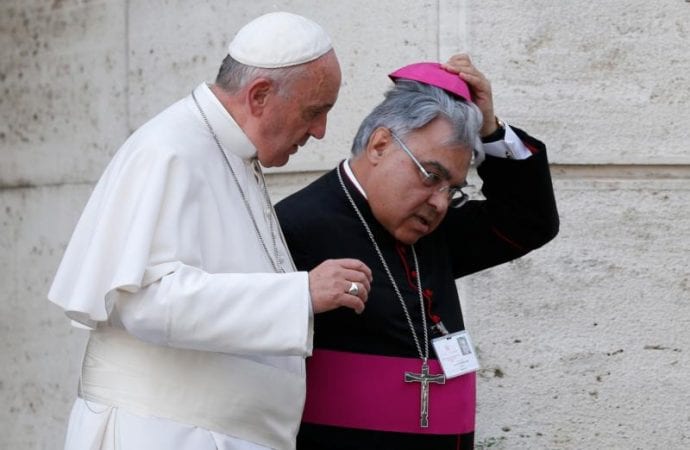Bishop Marcello Semeraro, who serves as secretary to Pope Francis’s council of cardinal advisors, said Thursday that doctrine alone is no longer enough to reach an increasingly post-Christian world.
Semeraro, who oversees the Italian diocese of Albano, was speaking about the proposed reform of the Roman Curia, the governing structure of the universal Catholic Church.
He told journalists June 27 that a “fundamental perspective” of Pope Francis’s reform efforts come from his emphasis on a missionary Church in his 2013 apostolic exhortation Evangelii Gaudium.
In the text, “the pope speaks of missionary conversion, transformation of the Church,” Semeraro said, stressing that this missionary aspect is lived and interpreted in the context of contemporary society.
Perceptions are rapidly changing, and much of modern society is “no longer within Christianity,” he said, adding that in the current cultural climate, “it is not enough to focus on the order of doctrine, but above all the proclamation … a proclamation which brings joy, otherwise it wouldn’t be the Gospel.”
Semeraro spoke to the press following the 30th meeting of Pope Francis’s council of cardinal advisors, who met in Rome June 25-27.
Formerly referred to as the “C9” before several of its members stepped aside, the body currently consists of six members - Vatican Secretary of State Cardinal Pietro Parolin, Honduran Cardinal Oscar Maradiaga, Italian Cardinal Giuseppe Bertollo, American Cardinal Sean O’Malley, German Cardinal Reinhard Marx, and Indian Cardinal Oswald Gracias.
All of them were present for the meeting, including Semeraro and the council’s adjunct secretary, Bishop Marco Mellino.
This round of meetings focused largely on reading input on Pope Francis’s coming apostolic constitution restructuring the Roman Curia, tentatively titled Praedicate Evangelium, a draft of which has been sent to the heads of all Vatican departments, bishops’ conferences, nuncios and certain law institutes for their comments before the document’s publication.
According to Semeraro, the council is currently knee-deep in a process of “intense listening” to the more than 200 pages of comments and observations on the draft.
Originally expected to be published this month, the constitution is now hoped to be published in September; however, Semeraro made no promises, saying the council hopes to have the document published “within the year.”
Semeraro’s emphasis on the missionary aspect of the Church gives credence to reports earlier this year that the powerful Congregation for the Doctrine of the Faith (CDF) will effectively be demoted under Francis’ curial reform.
A new “super-dicastery” for evangelization is expected to take precedence in the new restructuring, with another “super-dicastery” for charity also superseding the CDF.
In his comments to the press, Semeraro stressed that the Roman Curia is “an organism, a structure of salvation,” so changes are necessary in order to give an adequate response “to the needs of the world and the ecclesial reality” today.
He noted how the curia has been reformed multiple times, saying, “there were reforms from Paul VI and John Paul II, this is the reform of Pope Francis.”

